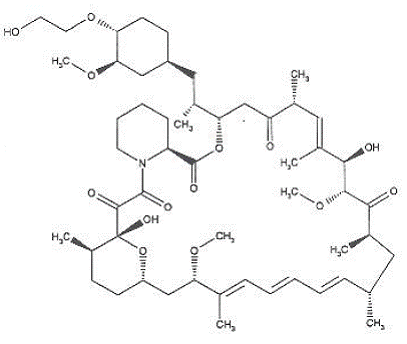Everolimus

Afinitor® (everolimus) was approved by the FDA in 2012. Everolimus is used in combination with exemestane to treat advanced hormone receptor-positive, HER2-negative breast cancer in postmenopausal women. It is also used to treat pancreatic neuroendocrine tumor (PNET) that cannot be treated with surgery, advanced kidney cancer that have not responded successfully to other treatments, angiomyolipoma, and subependymal giant cell astrocytoma (SEGA) that cannot be completely removed by surgery.1
- 1 Afinitor. http://www.us.afinitor.com
Everolimus (Afinitor®) is an mTOR (mammalian target of rapamycin) inhibitor. The mTOR pathway is dysregulated in many cancers. By inhibiting mTOR and blocking the effects caused by loss of TSC1/TSC2 genes, everolimus reduces cancer cell growth, proliferation, and angiogenesis. In turn these leads to apoptosis and reduced expression of VEGF.1
- 1 Chu, E., & DeVita, V. T. (2015). Physicians' cancer chemotherapy drug manual 2015. Burlington, MA: Jones & Bartlett Learning.
Most common side effects include: mouth ulcers, cough, diarrhea, constipation, skin problems, nausea, vomiting, fever, loss of appetite, weight loss, increased blood cholesterol levels, hyperglycemia, muscle spasms, abnormal taste or dry mouth, headache, hair loss, insomnia, high blood pressure, and dizziness.1
- 1 Chu, E., & DeVita, V. T. (2015). Physicians' cancer chemotherapy drug manual 2015. Burlington, MA: Jones & Bartlett Learning.
Due to possible severe liver effects, patients with prior liver issues should consult a physician. Everolimus should always be taken consistently and properly each day.1
- 1 Chu, E., & DeVita, V. T. (2015). Physicians' cancer chemotherapy drug manual 2015. Burlington, MA: Jones & Bartlett Learning.
